

AI, abbreviated for Artificial intelligence is a digital technology that has tremendous transformative potential. It has revolutionized various industries including the medical and healthcare industry.
AI technologies are continually evolving and their integration into medical devices is driving innovation to upgrade the medical devices as well. When AI medical technology is incorporated into medical devices, it refers to employing algorithms and machine learning techniques to enhance diagnostic accuracy, analyze and interpret complex medical data, recognize patterns, make informed predictions, and personalize treatment plans. In this article, we discuss what is AI in medical devices, its top technologies, benefits, and challenges.
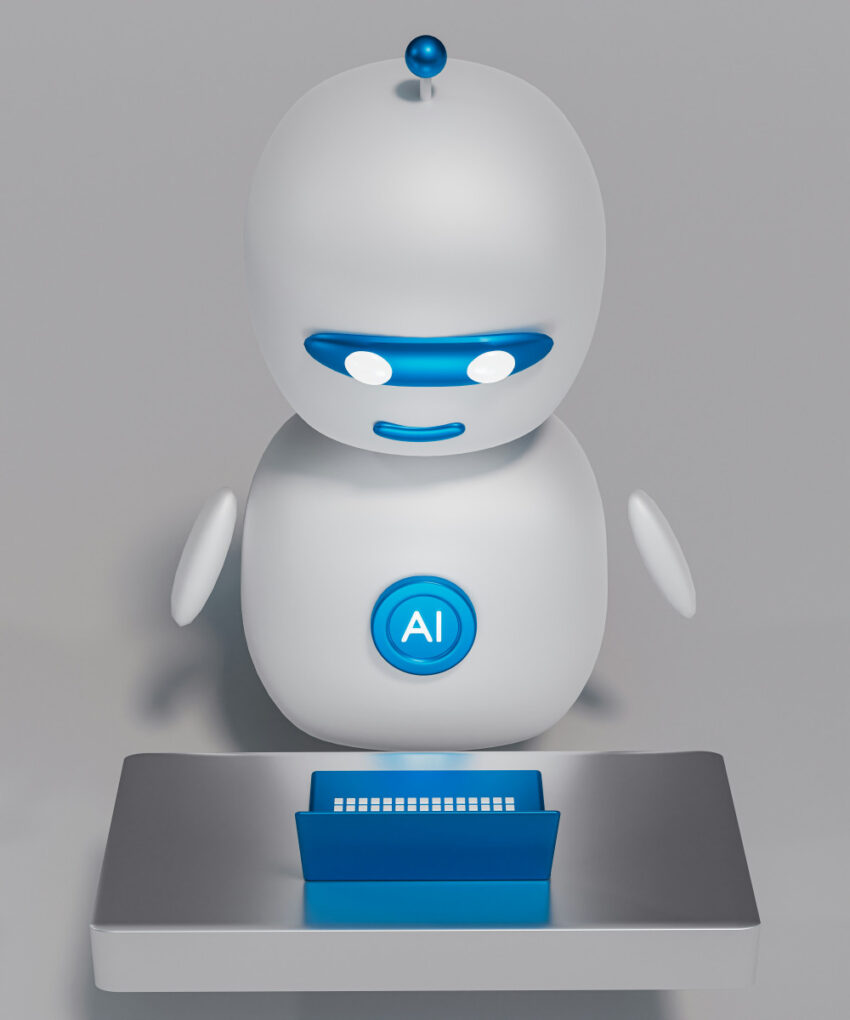
Artificial intelligence, abbreviated as AI is a technology that enables the machine to learn, perform, and make decisions by simulating human intelligence and activity.
AI in medical devices has revolutionized various aspects of the healthcare industry. It has managed to enhance diagnostic accuracy and treatment plans. AI medical technology can also analyze complex medical data, and predict patient outcomes with precision and accuracy. Today, AI in medical devices is employed for a variety of roles such as the identification of diseases, data classification and analysis, and diagnostic support application.
Medical devices are defined by their intended purpose. Thus, the software can itself be a medical device and it can also be a component or a part of a medical device. It can be an app, an internet-based service, or a part of a hardware medical device. AI-based software just like any other software is classified similarly.
AI medical technology is classified as a medical device if it can be incorporated for diagnosis, monitoring, prevention, prognosis, prediction, or treatment of a disease, disability, or injury. You can read the European Commission guidance document upon qualification and classification of software as medical devices.
The integration of AI in medical devices improves patient outcomes and creates a more efficient healthcare system. It enables healthcare professionals to facilitate the following:
AI medical technology enables early detection of diseases and assists healthcare professionals through insights, recommendations, and predictive analytics, thus, empowering them to make well-informed decisions. It is now possible to develop personalized treatment plans thereby, improving therapeutic efficacy.
The risk classes of medical devices that are integrated with AI software are similar to the risk classes of other medical devices.
The risk classes for medical devices are categorized on the risk that the medical device poses. You can read more about the medical device classification here and guidelines to SAMD i.e. Software as a Medical Device here.
AI medical technology is applied to various functions. Today, AI for medical devices is employed to serve the following functions:
AI in medical devices is employed for chronic disease management. It can be applied to monitor patients and deliver treatment. For instance: Sensors for diabetes patients monitor blood sugar levels and administer insulin to regulate them.
AI in medical devices is continually evolving to create better image quality and clarity in medical imaging. Such medical devices can reduce the patient’s exposure to radiation.
IoT, abbreviated for Internet of Things, is employed in medical devices to improve patient outcomes. IoT is a system of wireless, digital devices that are used by healthcare professionals to manage data, inform and monitor patients. It helps healthcare professionals to work more effectively and efficiently.
AI in medical devices makes use of various technologies. We have included some of the popular technologies in this section:
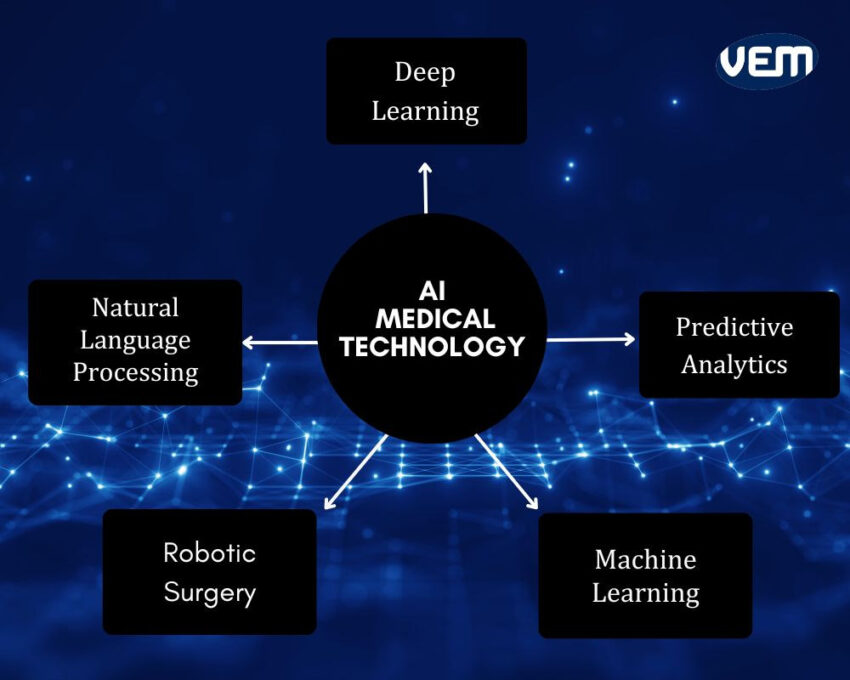
Machine learning is a type of technology that enables medical devices to learn from data and improve their performance. When equipped with machine learning technology, medical devices can predict patient outcomes and aid in treatment plans.
Deep learning is a form of machine learning that employs artificial neural networks to mimic human brain processes. Deep learning AI in Medical devices enables a more accurate diagnosis from medical images such as CT scans, X-rays, and MRIs through a comprehensive understanding of the details within the medical data.
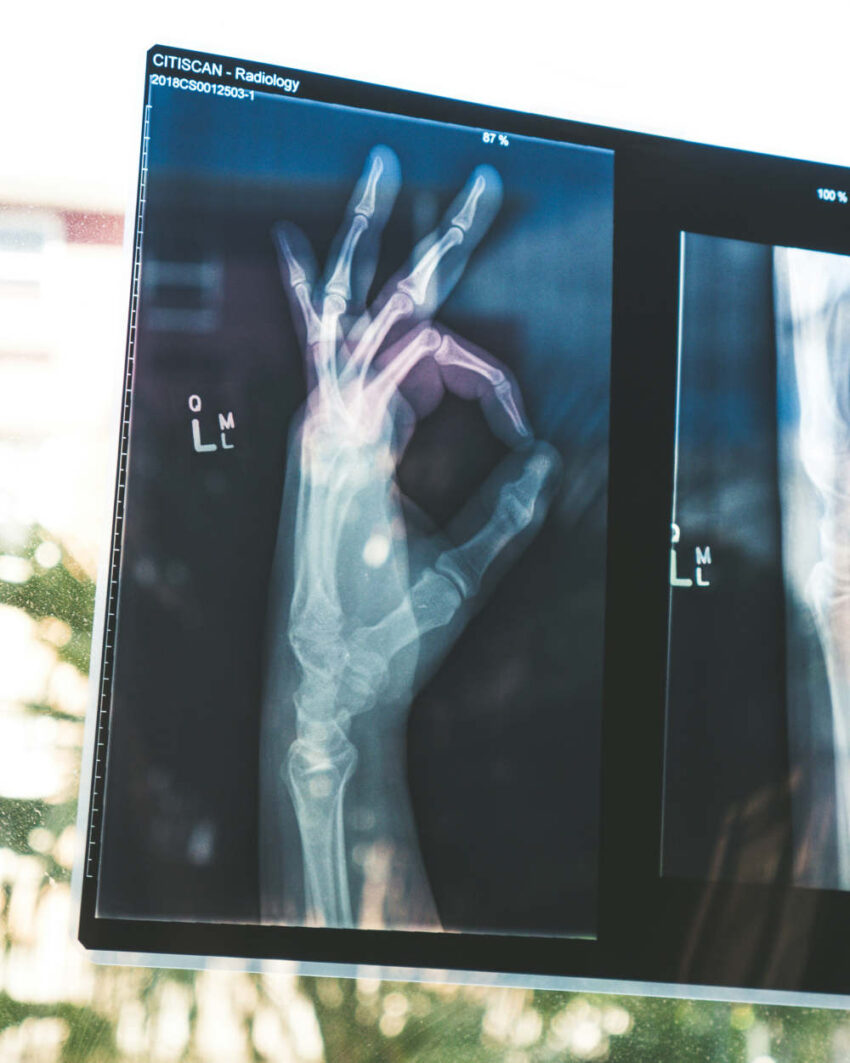
Natural language processing, abbreviated as NLP, is an AI technology that enables medical devices to comprehend and respond to human language. NLP is particularly crucial in EHR i.e. electronic health record analysis, clinical documentation, and patient communication.
AI in medical devices can predict patient outcomes by analyzing various parameters and historical data. This particular AI medical technology is referred to as predictive analysis and is employed to create forecasts thereby, enabling healthcare professionals to make pre-emptive decisions.
In the past decade, AI Medical technology has taken a monumental stride through robotic surgery. Today, robotic surgical systems that are AI-driven assist surgeons in performing delicate surgical procedures. Robotic surgery has managed to attain higher precision and control. In addition, it has reduced complications and recovery time.
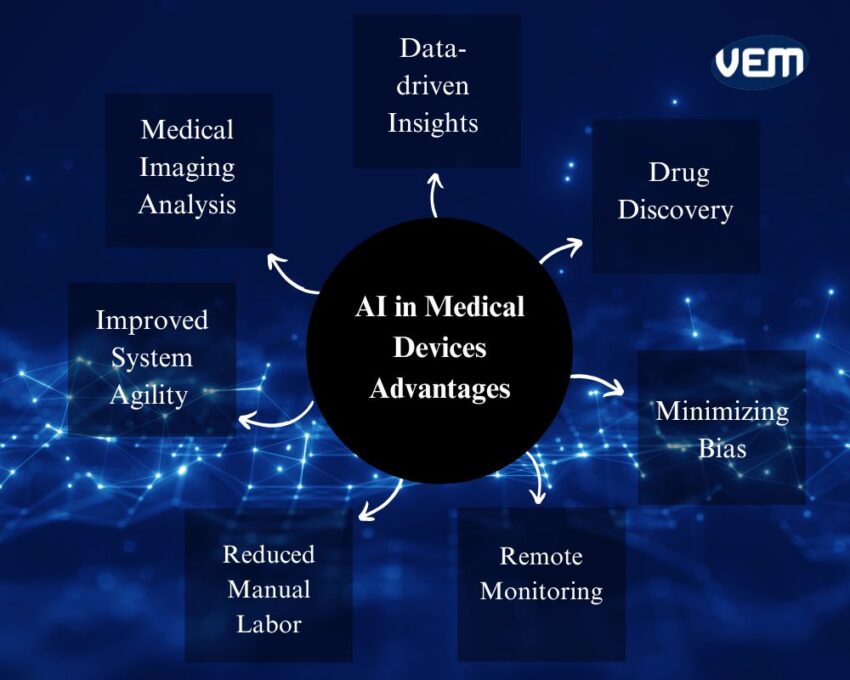
Automated systems are typically hindered due to rapid technological advancements. AI medical technology addresses such gaps by learning from the data generated. This further enables automation systems to adapt quickly so that there is an increased improvement in system agility.
AI medical technology enables the analysis of medical images to detect anomalies and various other changes that could otherwise remain undetected. Thus, the integration of AI in medical devices can expedite diagnosis and treatment planning through medical imaging analysis.
Data is now more readily available for analysis and insight generation. AI medical technology has not only made it possible to analyze data quickly but also derive insights in near real-time.
Medical device verification and validation is an arduous process that is carried out throughout the development process. Integration of AI in medical devices effectively eliminates bias during the various verification processes and test cycles.
AI for medical devices makes use of various cutting-edge technologies such as convolution-based deep neural networks for computer vision and transformer-based networks for NLP to mimic the complex cognitive process that is required to complete the task.
AI in medical devices accelerates drug development. AI medical technology is able to analyze large datasets that can predict potential drug candidates. It can also help to optimize molecular structures and simulate drug interactions.
AI in medical devices enables devices to monitor patients remotely. AI medical technology enables devices to collect data for vital signs and symptoms, thus, enabling timely intervention.
Test cases for medical devices are typically designed by highly skilled healthcare professionals and automation engineers. It requires a collaborative effort that includes teams comprising multi-disciplinary areas and skills. AI medical technology makes it possible to generate test cases automatically.
Testing medical devices is a detailed and complex task. Various quality standards, safety, and regulatory requirements need to be met and adhered to, making manual testing arduous. AI in medical devices reduces manual testing by implementing images and other sensors, which further improves testing speed and accuracy.
AI is cutting-edge and it provides various benefits but it also presents manufacturers with a unique set of challenges and risks. Let’s understand specific concerns associated with AI for medical devices:
Medical devices that incorporate AI technology are extremely vulnerable to cyberattacks. This further compromises the functionality of the device and patient safety. It is thus necessary to follow the best practices for cybersecurity and implement strong measures, such as encryption, and intrusion detection systems.
Collaboration of AI with humans is crucial to designing AI systems. If there isn’t appropriate oversight and intervention by humans, it can lead to errors during critical decisions.
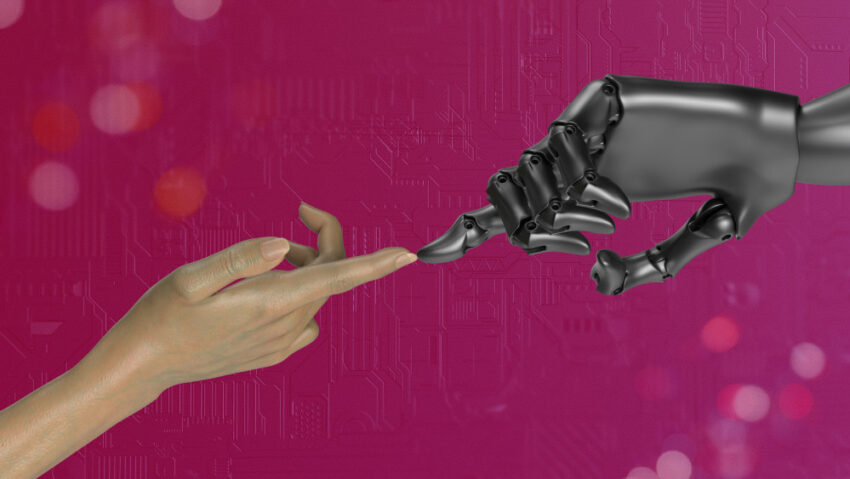
Machine learning is built on data from which it learns which is why AI in medical devices relies on high-quality and unbiased data. The performance of AI in medical devices is negatively affected if the data set is inaccurate, or biased. Thus, it’s critical to employ the right data set.
It is imperative to balance innovation with patient safety which is why the guidelines and standards for AI in medical devices must be met. The challenge, however; is that the regulatory standards and requirements are still evolving due to the continuous and rapid advancements in AI technology.
Various ethical considerations for AI in medical devices, such as patient autonomy and informed consent, exist. It is still a developing arena, and ethicists and healthcare professionals need to ensure that AI applications align with societal values.
Integrating AI in medical devices is a complex process. It’s crucial to understand the various technical and regulatory requirements.
VEM Medical has over 20 years of experience in creating and manufacturing high-quality medical devices. We can help you with an end-to-end solution for developing medical devices with AI software, SAMD, and more.